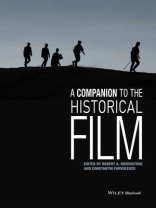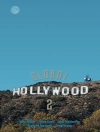Broad in scope, this interdisciplinary collection of original scholarship on historical film features essays that explore the many facets of this expanding field and provide a platform for promising avenues of research.
- Offers a unique collection of cutting edge research that questions the intention behind and influence of historical film
- Essays range in scope from inclusive broad-ranging subjects such as political contexts, to focused assessments of individual films and auteurs
- Prefaced with an introductory survey of the field by its two distinguished editors
- Features interdisciplinary contributions from scholars in the fields of History, Film Studies, Anthropology, and Cultural and Literary Studies
สารบัญ
Notes on Contributors viii
Introduction 1
Robert A. Rosenstone and Constantin Parvulescu
Part 1 History and the Medium of Film
1 Politics and the Historical Film: Hotel Rwanda and the Form of Engagement 11
Alison Landsberg
2 History as Palimpsest: Stanley Kubrick’s Barry Lyndon (1975) 30
Maria Pramaggiore
3 Flagging up History: The Past as a DVD Bonus Feature 53
Debra Ramsay
4 The History Film as a Mode of Historical Thought 71
Robert A. Rosenstone
Part 2 Filmmakers as Historians
5 Julia’s Resistant History:Women’s Historical Films in Hollywood and the Legacy of Citizen Kane 91
J. E. Smyth
6 Mark Donskoi’s Gorky Trilogy and the Stalinist Biopic 110
Denise J. Youngblood
7 The Subjects of History: Italian Filmmakers as Historians 133
Marcia Landy
8 Andrzej Wajda as Historian 154
Piotr Witek
Part 3 Telling Lives: The Biopic
9 Oliver Stone’s Nixon: The Rise and Fall of a Political Gangster 179
Willem Hesling
10 Authorial Histories: The Historical Film and the Literary Biopic 199
Hila Shachar
11 The Biopic in Hindi Cinema 219
Rachel Dwyer
12 The Lives and Times of the Biopic 233
Dennis Bingham
Part 4 Cinema and the Nation
13 Gang Wars:Warner Brothers’ The Roaring Twenties Stars, News, and the New Deal 257
Paula Rabinowitz
14 State Terrorism on Film: Argentine Cinema during the First Years of Democracy (1983–1990) 283
Mario Ranalletti
15 Fossil Frontiers: American Petroleum History on Film 301
Georgiana Banita
16 Sounding the Depths of History: Opera and National Identity in Italian Film 328
Roger Hillman
Part 5 Wars and Revolutions
17 Generational Memory and Affect in Letters from Iwo Jima 349
Robert Burgoyne
18 Post-Heroic Revolution: Depicting the 1989 Events in the Romanian Historical Film of the Twenty-First Century 365
Constantin Parvulescu
19 In Country: Narrating the Iraq War in Contemporary US Cinema 384
Guy Westwell
Part 6 Premodern Times
20 Heart and Clock: Time and History in The Immortal Heart and Other Films about the Middle Ages 407
Bettina Bildhauer
21 The Anti-Samurai Film 425
Thomas Keirstead
Part 7 Slavery and the Postcolonial World
22 The Politics of Cine-Memory: Signifying Slavery in the History Film 445
Michael T. Martin and David C.Wall
23 The African Past on Screen: Moving beyond Dualism 468
Vivian Bickford-Smith
24 Colonial Legacies in Contemporary French Cinema: Jews and Muslims on Screen 490
Catherine Portuges
25 “What’s Love Got to Do with It?”: Sympathy, Antipathy, and the Unsettling of Colonial American History in Film 513
Louis Kirk Mc Auley
Index 540
เกี่ยวกับผู้แต่ง
Robert A. Rosenstone is Professor Emeritus of History at the California Institute of Technology. His recent scholarship has focused on the overlapping topics of new narrative forms and history’s relationship to the visual media. He has published a dozen books, including Romantic Revolutionary: A Biography of John Reed (1975) , Mirror in the Shrine: American Encounters in Meiji Japan (1988), and King of Odessa: A Novel of Isaac Babel (2005). His works on film include Visions of the Past: the Challenge of Film to Our Idea of History (1995), Revisioning History: Film and the Construction of a New Past (1995), and History on Film / Film on History (2006, 2nd edition 2012). He created the film section of the American Historical Review and has lectured around the world.
Constantin Parvulescu is research fellow at the Institute for Culture and Society at the University of Navarra. He is the author of Orphans of the East: Postwar Eastern European Cinema and the Revolutionary Subject, Indiana University Press, 2015, and has published several articles on the relationship between cinema, history, and political and economic dicsourse.












